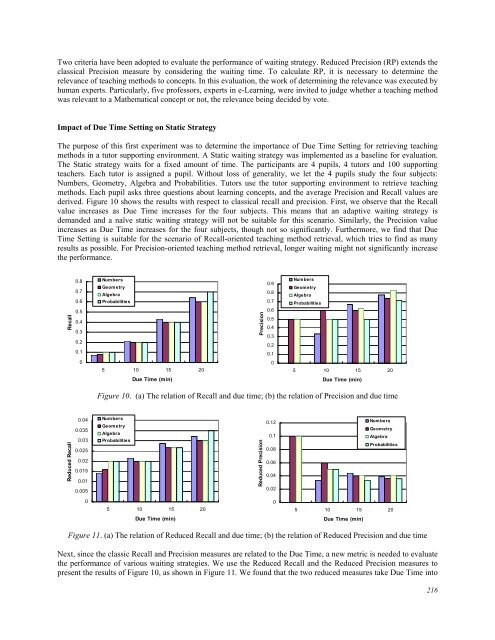October 2011 Volume 14 Number 4 - Educational Technology ...
October 2011 Volume 14 Number 4 - Educational Technology ...
October 2011 Volume 14 Number 4 - Educational Technology ...
You also want an ePaper? Increase the reach of your titles
YUMPU automatically turns print PDFs into web optimized ePapers that Google loves.
Two criteria have been adopted to evaluate the performance of waiting strategy. Reduced Precision (RP) extends the<br />
classical Precision measure by considering the waiting time. To calculate RP, it is necessary to determine the<br />
relevance of teaching methods to concepts. In this evaluation, the work of determining the relevance was executed by<br />
human experts. Particularly, five professors, experts in e-Learning, were invited to judge whether a teaching method<br />
was relevant to a Mathematical concept or not, the relevance being decided by vote.<br />
Impact of Due Time Setting on Static Strategy<br />
The purpose of this first experiment was to determine the importance of Due Time Setting for retrieving teaching<br />
methods in a tutor supporting environment. A Static waiting strategy was implemented as a baseline for evaluation.<br />
The Static strategy waits for a fixed amount of time. The participants are 4 pupils, 4 tutors and 100 supporting<br />
teachers. Each tutor is assigned a pupil. Without loss of generality, we let the 4 pupils study the four subjects:<br />
<strong>Number</strong>s, Geometry, Algebra and Probabilities. Tutors use the tutor supporting environment to retrieve teaching<br />
methods. Each pupil asks three questions about learning concepts, and the average Precision and Recall values are<br />
derived. Figure 10 shows the results with respect to classical recall and precision. First, we observe that the Recall<br />
value increases as Due Time increases for the four subjects. This means that an adaptive waiting strategy is<br />
demanded and a naïve static waiting strategy will not be suitable for this scenario. Similarly, the Precision value<br />
increases as Due Time increases for the four subjects, though not so significantly. Furthermore, we find that Due<br />
Time Setting is suitable for the scenario of Recall-oriented teaching method retrieval, which tries to find as many<br />
results as possible. For Precision-oriented teaching method retrieval, longer waiting might not significantly increase<br />
the performance.<br />
Recall<br />
Reduced Recall<br />
0.8<br />
0.7<br />
0.6<br />
0.5<br />
0.4<br />
0.3<br />
0.2<br />
0.1<br />
0<br />
0.04<br />
0.035<br />
0.03<br />
0.025<br />
0.02<br />
0.015<br />
0.01<br />
0.005<br />
0<br />
Num bers<br />
Geom etry<br />
Algebra<br />
Probabilities<br />
5 10 15 20<br />
Due Time (min)<br />
Precision<br />
0.9<br />
0.8<br />
0.7<br />
0.6<br />
0.5<br />
0.4<br />
0.3<br />
0.2<br />
0.1<br />
0<br />
<strong>Number</strong>s<br />
Geom etry<br />
Algebra<br />
Probabilities<br />
5 10 15 20<br />
Due Time (min)<br />
Figure 10. (a) The relation of Recall and due time; (b) the relation of Precision and due time<br />
<strong>Number</strong>s<br />
Geom etry<br />
Algebra<br />
Probabilities<br />
5 10 15 20<br />
Due Time (min)<br />
Reduced Precision<br />
0.12<br />
0.1<br />
0.08<br />
0.06<br />
0.04<br />
0.02<br />
0<br />
5 10 15 20<br />
Due Time (min)<br />
Num bers<br />
Geom etry<br />
Algebra<br />
Probabilities<br />
Figure 11. (a) The relation of Reduced Recall and due time; (b) the relation of Reduced Precision and due time<br />
Next, since the classic Recall and Precision measures are related to the Due Time, a new metric is needed to evaluate<br />
the performance of various waiting strategies. We use the Reduced Recall and the Reduced Precision measures to<br />
present the results of Figure 10, as shown in Figure 11. We found that the two reduced measures take Due Time into<br />
216

















